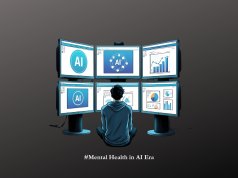In the heart of New York, where the pace of work often mirrors the city’s ceaseless hustle, a silent crisis brews within the high walls of its most prestigious industries. As we applaud the relentless pursuit of productivity and success in the finance, legal, and tech sectors, we inadvertently turn a blind eye to an alarming development: the escalating mental health crisis among the workforce. The incessant demand to perform and excel in these high-stress environments is not without its casualties, and it is time to confront the toll it is taking on our city’s most valuable asset—its people.
The statistics are startling. A recent study revealed that a significant percentage of employees in New York’s high-stress sectors experience symptoms of burnout, anxiety, and depression. The quest for excellence in these fields often means grueling hours, cutthroat competition, and constant pressure to outperform. In finance, the line between ‘hardworking’ and ‘overworking’ blurs, with professionals frequently clocking in more than 60 hours a week. The legal arena battles its own demons, with lawyers facing intense stress from high-stakes cases and the expectation of being ‘always on’. Tech industry workers, hailed as pioneers of innovation, often operate in a culture that prizes disruption and velocity over balance and well-being.
Employers bear a critical responsibility in this context. It is essential for companies to recognize that the mental well-being of their employees is not just a personal issue but a business imperative. Acknowledging the prevalence of mental health concerns is the first step towards addressing them. Measures must be implemented to promote a healthier work-life balance, provide access to mental health resources, and build an organizational culture that does not stigmatize mental illnesses.
Workplace policies need to evolve to support the holistic well-being of employees. This can include flexible working hours, telecommuting options, mandatory time-off policies, and the provision of in-house mental health services or counseling. Encouraging regular breaks, offering stress management workshops, and creating quiet spaces for relaxation within the office environment can also make a substantial difference.
Yet, policy changes alone are not enough. The role of employee advocates is crucial in fostering a culture of openness and support regarding mental health. Advocates can serve as a bridge between the workforce and management, ensuring that mental health remains a priority on the corporate agenda. They can organize peer support groups, spearhead awareness campaigns, and be the custodians of a safe space where employees feel comfortable sharing their struggles without fear of judgment or reprisal.
The time to act is now. As we stand at the intersection of innovation and human sustainability, we must choose a path that values the well-being of our workforce as much as the brilliance of their output. A workforce that thrives both mentally and professionally is not just a utopian ideal—it should be the standard towards which every high-pressure workplace in New York aspires. Only then can we truly claim success in the most meaningful sense of the word.



























